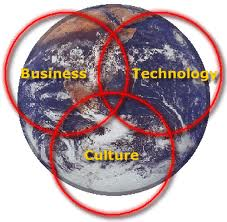 In the previous segment of the Globalization: The Leadership Challenge Ahead article series we addressed the ongoing debate of whether globalization is good or bad for the economy. Now, let’s turn our attention to the global business challenges.
In the previous segment of the Globalization: The Leadership Challenge Ahead article series we addressed the ongoing debate of whether globalization is good or bad for the economy. Now, let’s turn our attention to the global business challenges.
Some 20+ years ago, I first addressed the topic of global business challenges as a part of my speech at a graduate school symposium at the University of Oklahoma. One of the charts in my presentation listed the major challenges of competing in a global marketplace; similar to what is shown below.
- Language barriers
- Cultural diversity
- Complex business models
- Monetary policy + exchange rates
- Geo-political environments
- Lack of brand identity
- Cross border shipment of goods and services
- Rules and conventions governing foreign trade
- Naivety, poor preparation and planning
- “The Wussification of America”
If you carefully consider these challenges, most are obstacles common to any business attempting to conduct commerce outside its own borders. These are not constraints limited to just U.S. companies attempting to do business abroad. (Remember the example from the January 17th blog article of the global economy as a two-way mirror). Today, many of these global business challenges can be readily overcome if yours is an e-commerce business, or by establishing global partnerships and the effective use of social media to help bridge the gap.
The two bolded items in the list above were not a part of the OU presentation, but to a large degree reflect the growing beliefs of many in the international community that the U.S. has lost its competitive edge as a result of its naivety, poor preparation and planning in attempting to do business globally, and as a society we’re perceived as soft, lazy, complacent, etc.
That is not my opinion; however, I do believe that most U.S. business leaders are ill prepared for the complexity of today’s rapidly changing global business environment, and this is the major hurdle we must overcome to compete effectively in the global economy. Atul Gawande summed it up best in his book, The Checklist Manifesto: How to Get Things Right, when he states “the volume and complexity of what we know has exceeded our individual ability to deliver its benefits correctly, safely, or reliably. Knowledge has both saved us and burdened us.”
IBM’s recent CEO Study Capitalizing on Complexity www-935.ibm.com/s… reinforces this same notion. The study released last year offers insights from interviews conducted with 1,541 CEO’s worldwide and concluded the following … “Most CEOs seriously doubt their ability to cope with the rapidly escalating complexity.” Now that’s the bad news.
The good news from IBM’s study was that one set of CEO’s and their representative companies have consistently performed well. How do these “Stand Outs” mitigate complexity and even convert it into opportunity?” And what are the leadership characteristics and competencies you need to compete more effectively in the ‘New World’ economy? That is what we will highlight in the next segment of this blog series, so watch for the article titled “Globalization: The Leadership Difference” in the next few weeks.
In the meantime, let me hear from you. What are the global business challenges you are facing today in your business, and what steps are you taking to address them?
COPYRIGHT © 2011 John Carroll